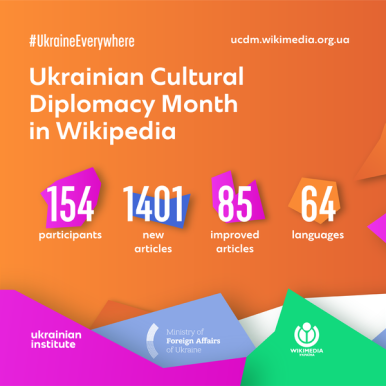March of 2023 was distinguished across all Wikipedias for hosting Ukraine’s Cultural Diplomacy Month: an annual campaign that sets a goal of creating better coverage of Ukrainian culture and people across all projects, organized by Wikimedia Ukraine and the Ukrainian Institute. This way apart from sharing interesting cultural phenomena, high-quality information can be ensured for the readers. This year Ukraine’s Cultural Diplomacy Month reached exceptional results, which I would like to present to you in this post.
154 participants took on the challenge, 60% of which were new to the challenge, and wrote 1401 new articles along with 85 improved ones. This year we broke the record for the number of language editions of Wikipedia taking part in the contest at 64. While numerical results are always interesting to analyze, I want also to share some particular stories and achievements.
Contributions by participants span across all types of arts and culture. Articles on staples of Ukrainian literature have appeared as, for example, “Maria” now has a page in Gujarati, “Forest Song” in German, “Cathedral” in Belarussian, “City” in Arabic, and “Eneida” in Welsh. The most celebrated writers gained recognition as articles about Lina Kostenko and Vasyl Stus were written in Hungarian, Marko Vovchok in Basque, Taras Shevchenko in Inari Sámi, Mychailo Draj-Chmara in Spanish, and Lesya Ukrainka in Volapük.
“I dedicated years of my life outside of Wikipedia to promotion of Ukrainian culture in Russia by way of translating and publishing Ukrainian poetry. My efforts and efforts of my friends and colleagues in Russia failed, we were unable to bring Ukrainian culture to the wider audience more interested in shauvinistic propaganda of Russian fascist government. Still in my exile I feel obliged to keep informing Russian readership about achievements of Ukrainian culture as far as I believe that one would never shoot at the culture one has respect to.”
participant Андрей Романенко
Ukrainian visual artists now also have better exposure on the pages of Wikipedia providing articles written about Ivan Marchuk in Japanese, Mykhailo Boychuk in Romanian and Kotava, Kateryna Bilokur in Georgian, Zofia Albinowska-Minkiewiczowa in Azerbaijani as well as about paintings “A Victim of Fanaticism” in Portuguese and “Kateryna” in Esperanto.
“I joined your Campaign to honor my late mother. She was in Europe in mid ‘60s, and cherished the children’s book based on Ukrainian fable of a mitten hosting forest animals“
participant Omotecho from Japan, joined the project for the third time
Reflecting on the deep musical culture of Ukraine, articles appeared about the following songs: “A Duckling Swims in the Tisza” in English, “What a Moonlit Night” in Bulgarian, and “Prayer for Ukraine” in Chinese. Composers Mykola Lysenko and Vasyl Verkhovynets obtained articles in Romanian and Tamil respectively.
“Through my participation in the contest, I sought to address this issue and contribute to the dissemination of accurate and comprehensive information about Ukraine. By creating articles about Ukraine’s culture and history, I hoped to provide Azerbaijani speakers with a deeper understanding and appreciation of Ukraine’s rich heritage and unique contributions to world culture.”
participant Solavirum
Ukrainian theater also got more exposure as articles about the play “Natalka Poltavka” were written in French and Esperanto, the opera “Moses” in German, Theatre of Coryphaei in Bulgarian, Les Kurbas Theatre in Italian and Maria Zankovetska in Belarussian.
“I wanted to help Ukraine somehow. One of the ways, I figured, was by raising awareness about the depth of Ukrainian culture. This time, I focused specifically on translating articles about places of interest in Ukraine, such as museums, theaters, and opera houses. I hope the information would drive more people to visit Ukraine after the war, bringing in some tourist revenue”
participant Nyagoslav Zhekov from Malaysia.
Various articles connected to Ukrainian cinema appeared starting from such classics as “Earth” in Hungarian and “The Stone Cross” in Punjabi to modern “Homeward” in Odia and “The Earth Is Blue as an Orange” in Latvian.
The organizing team is grateful for every and each contribution during the contest, no matter how small or large. We hope that, despite all obstacles, we will keep to our mission of sharing knowledge with the whole world! I want to end this post by citing one of the articles, written during the contest in Estonian: Slava Ukrajini!

Can you help us translate this article?
In order for this article to reach as many people as possible we would like your help. Can you translate this article to get the message out?
Start translation
